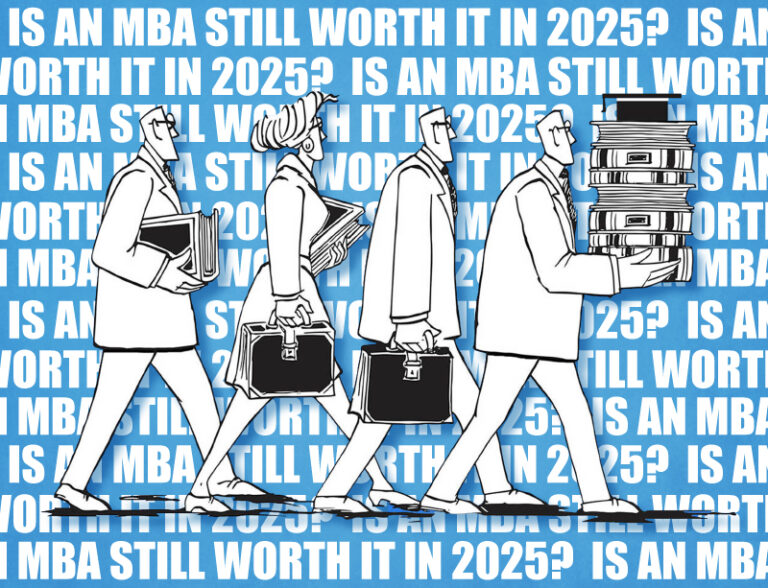Contact Us
[email protected]
Is an MBA Still Worth It in 2025?

Rethinking the ROI of an MBA in a Rapidly Changing World.
For decades, an MBA from a top business school was considered a golden ticket to high-paying jobs, fast-track promotions, and prestige. But as the business world evolves, so too does the value proposition of an MBA. In 2025, the question isn’t just whether an MBA is worth it—it’s what kind of MBA, from where, and for whom.
The Traditional MBA Promise: Under Pressure
The classic MBA value equation was straightforward: invest two years and over $100,000, and reap the rewards through post-graduation salary boosts, leadership roles, and access to elite networks. While many of these benefits still exist, the formula is no longer guaranteed.
Top tech companies like Google, Meta, and IBM have made headlines by dropping degree requirements altogether. Instead, they emphasize real-world experience, adaptability, and digital fluency. In parallel, some traditional MBA programs are struggling to keep pace with changing market needs—focusing on legacy case studies while neglecting skills like digital marketing, UX strategy, or AI-powered decision-making.
Moreover, several well-known MBA programs have reported declining job placement rates, raising flags about whether the traditional model still delivers a strong return on investment (ROI).
What’s Missing in Some MBA Programs?
Critics argue that many MBA programs fall short in preparing students for today’s entrepreneurial and digital economy. Skills like networking, selling, interviewing, and managing personal finances—arguably more useful for startup founders or mid-career pivoters—are often treated as peripheral, if at all.
Add to that the opportunity cost: enrolling in a full-time MBA typically means stepping away from a stable salary for up to two years, while simultaneously shouldering tuition bills that can exceed $120,000. It’s a bold move in a world increasingly valuing agility, experience, and results over formal credentials.
Why an MBA Still Matters in 2025
Salary and job outlook
Despite the critiques, MBAs aren’t obsolete. Far from it. For many professionals, an MBA remains a career-transforming milestone. The key is choosing the right program, at the right time, with the right goals.
1. Strong Salary Potential & Career Mobility
The real question is not whether MBAs are “worth it” in general, but whether an MBA aligns with your career vision, learning style, and financial capacity.
According to the 2024 GMAC Corporate Recruiters Survey: – Median salary for MBA graduates in the U.S. was $120,000 – In contrast, bachelor’s degree holders earned a median of $69,320 – 86% of 2022 MBA grads were employed upon graduation—a 6% increase from 2021
While these stats vary by industry and geography, they underscore a persistent truth: MBAs often serve as accelerators for both pay and promotion.
2. In-Demand, Transferable Skills
Employers continue to value the well-rounded capabilities cultivated through rigorous MBA programs: – Strategic thinking & systems leadership – Data-driven decision-making – Communication & interpersonal influence – Innovation, entrepreneurship, and resilience
For companies navigating uncertainty and digital transformation, MBA talent brings a structured yet adaptable mindset.
3. Expanded Career Resources & Alumni Networks
Business schools are increasingly investing in career development as a core part of the MBA experience. From executive coaching and mentorship to global recruitment fairs and real-world consulting projects, students now have more support than ever in securing impactful roles.
Additionally, elite MBA programs offer access to powerful alumni networks that span continents and industries—connections that can open doors long after graduation.
Is the MBA Right for You?
The real question is not whether MBAs are “worth it” in general, but whether an MBA aligns with your career vision, learning style, and financial capacity.
Ask yourself:
– Are you looking to pivot industries, gain leadership credibility, or launch a business?
– Can you afford the time and money investment, or would a part-time or online program suit you better?
– Do you value academic rigor, or would a skills bootcamp or micro-credential fill the gap?
In 2025, the MBA has become more than a credential—it’s a strategic tool. When chosen wisely and used intentionally, it can still deliver immense career value.
Bottom Line: The MBA isn’t dead. It’s evolving. For those who pair the degree with digital skills, global awareness, and career clarity, the ROI can still be substantial. The real challenge isn’t whether to get an MBA—it’s how to make it work for you.




